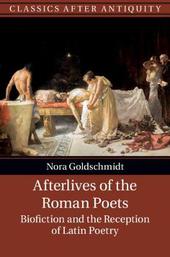
|
Afterlives of the Roman Poets: Biofiction and the Reception of Latin Poetry
Hardback
Main Details
| Title |
Afterlives of the Roman Poets: Biofiction and the Reception of Latin Poetry
|
| Authors and Contributors |
By (author) Nora Goldschmidt
|
| Series | Classics after Antiquity |
|---|
| Physical Properties |
| Format:Hardback | | Pages:360 | | Dimensions(mm): Height 234,Width 159 |
|
| Category/Genre | Literary studies - classical, early and medieval
Literary studies - poetry and poets |
|---|
| ISBN/Barcode |
9781107180253
|
| Classifications | Dewey:871.0109 |
|---|
| Audience | | Professional & Vocational | |
|---|
| Illustrations |
Worked examples or Exercises; 2 Halftones, black and white
|
|
Publishing Details |
| Publisher |
Cambridge University Press
|
| Imprint |
Cambridge University Press
|
| Publication Date |
5 December 2019 |
| Publication Country |
United Kingdom
|
Description
Conscious of ancient modes of reading poetry 'for the life', Roman poets encoded versions of their lives into their texts. The result is a body of literature that cries out to be read in terms of lives in reception. Afterlives of the Roman Poets shows how the fictional biographies (or 'biofictions') of its authors have shaped the reception of Latin poetry. From medieval biographies of Ovid inscribed in the margins of his texts to republican readings of Lucan's death in periods of revolution to the 'death of the author' in Hermann Broch's Der Tod des Vergil, the book tells a cultural history of the reception of ancient literature as imagined through the lens of poets' lives. Putting modern life-writing studies and ancient poetry into dialogue, it brings biofictional reception to debates in classics, and puts antiquity and its reception onto the map of modern studies in life-writing.
Author Biography
Nora Goldschmidt is Associate Professor of Classics and Ancient History at Durham University. Her publications include Shaggy Crowns: Ennius' Annales and Virgil's Aeneid (2013) and (edited with Barbara Graziosi) Tombs of the Ancient Poets: Between Literary Reception and Material Culture (2018).
|